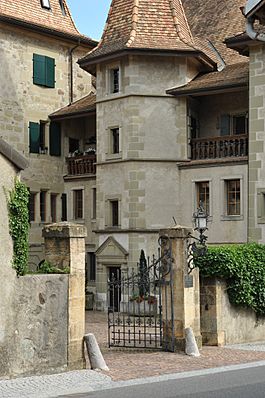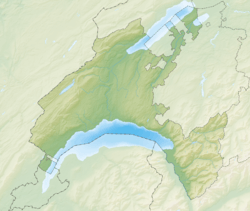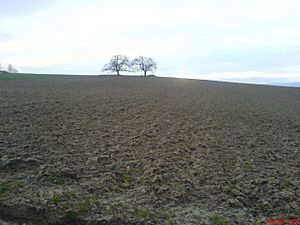Échandens facts for kids
Quick facts for kids
Échandens
|
||
|---|---|---|

Échandens Castle
|
||
|
||
| Country | Switzerland | |
| Canton | Vaud | |
| District | Morges | |
| Area | ||
| • Total | 3.88 km2 (1.50 sq mi) | |
| Elevation | 432 m (1,417 ft) | |
| Population
(Dec 2020 )
|
||
| • Total | 2,735 | |
| • Density | 704.9/km2 (1,825.7/sq mi) | |
| Postal code |
1026
|
|
| Surrounded by | Bremblens, Bussigny-près-Lausanne, Denges, Écublens, Lonay | |
Échandens is a small town, also called a municipality, located in the Morges area of the Canton of Vaud in Switzerland. It's a lovely place with a rich history and beautiful surroundings.
Contents
A Look Back in Time
Échandens has been around for a long time! The first time it was ever written about was in the year 1164. Back then, it was known by a slightly different name: Scandens.
Where is Échandens?
Échandens covers an area of about 3.9 square kilometers (or 1.5 square miles). Imagine a square about 2 kilometers on each side!
Most of this land, about 52%, is used for farming. This means you'll see lots of fields and crops. About 18% of the area is covered by forests, perfect for exploring nature. The rest of the land, about 29%, has buildings and roads. A tiny part, less than 1%, is made up of rivers or lakes.
The town is part of the Morges District. It includes the main village of Échandens and a smaller area called Les Abbesses.
What's on the Coat of Arms?
A coat of arms is like a special symbol for a town or family. The coat of arms for Échandens is quite simple but striking. It shows a red background with two silver "chevrons." A chevron is a V-shape, like the stripes you might see on a military uniform.
Who Lives in Échandens?
Échandens is home to about 2,000 people. A small number of people living here, about 17%, are from other countries.
Most people in Échandens speak French, which is the main language. About 86% of the people speak French. You'll also hear some people speaking German (about 6%) and Italian (about 2%).
Many people who live in Échandens were also born there. About 18% of the residents were born in the town itself. More than 40% were born in the same canton, which is like a state or region in Switzerland.
The chart below shows how the population of Échandens has changed over many years:

How Échandens is Governed
Like any town, Échandens has its own local government. In the 2007 national election, people in Échandens voted for different political parties. The most popular party was the SVP. Other popular parties included the FDP, the SP, and the Green Party. About half of the people who could vote actually did vote in that election.
What People Do for Work
In Échandens, people work in different types of jobs. The unemployment rate is quite low, around 3%.
Many people work in the "tertiary sector." This includes jobs like working in shops, restaurants, or offices. There are also jobs in the "secondary sector," which means working in factories or construction. A smaller number of people work in the "primary sector," which mostly involves farming.
Many people who live in Échandens travel to other towns for work. Also, some people come into Échandens from other places to work here. Most people use a private car to get to work, while some use public transportation.
Beliefs and Religions
In Échandens, people follow different religions. Most people, about 53%, belong to the Swiss Reformed Church. About 27% of the people are Roman Catholic. There are also smaller groups of people who belong to other Christian churches, the Orthodox Church, or are Islamic. Some people do not follow any religion.
Learning and Schools
Education is important in Échandens. Many adults have finished high school, and a good number have also gone on to college or university.
The local school district has students from different age groups. There are students in primary school (the first four years of school) and also in lower secondary school (the next six years). Some younger children also attend pre-school.
While many students go to school in Échandens, some students from Échandens attend schools in other towns. Also, some students from other towns come to Échandens for school.
See also
 In Spanish: Echandens para niños
In Spanish: Echandens para niños
 | George Robert Carruthers |
 | Patricia Bath |
 | Jan Ernst Matzeliger |
 | Alexander Miles |





